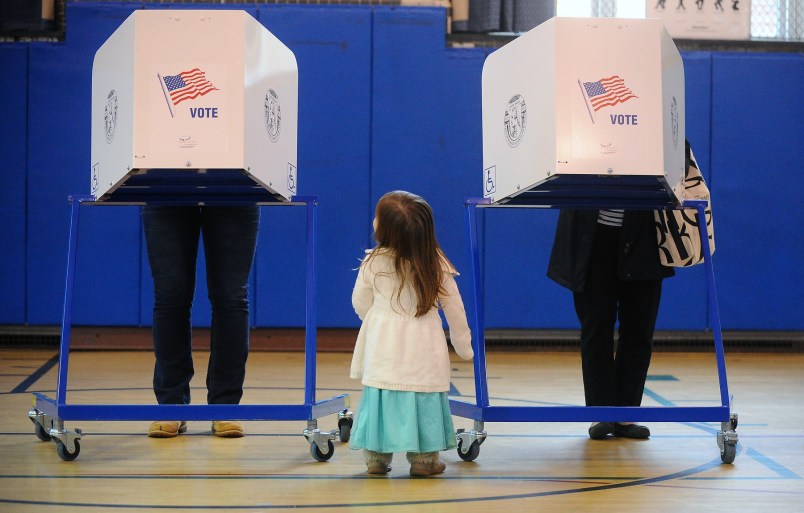As I wrote last week, the voting system in New York State is simply terrible. It’s generally restrictive. And we’ve introduced none of the reforms of the last decade or two which are designed to make voting more accessible for occasional voters or people whose work or family responsibilities make voting difficult. I’m talking here about things like early voting, mail in voting, same day registration, etc. The reason is simple: no one cares. And by no one, I mean no organized interest is interested in changing it.
New York is a very blue state in federal politics; and there’s extreme partisan collusion in state politics. So no one is really invested in boosting turn out or making it easier to vote. Everyone (again, parties, organized interests, etc.) is either resigned to how things are or happy about how they are.
Ohio, Florida, Pennsylvania, North Carolina – totally different story. But in New York, no one even cares enough to suppress our vote.
Over the last few days there’s been a boomlet of agitation over the state’s closed primary: the rules that says only registered Democrats and Registered Republicans can vote in each party’s respective primary. There are really two issues in play – the concept of a closed primary itself and the fact that New York forces you to change your party registration months in advance. To be specific, if you’re a new voter it’s not an issue. But if you’re already registered as an independent you had to change your registration back in October. In other words, like six months before the primary. That’s why the Trump kids actually can’t vote for their dad today – because they didn’t shift their registration from independent to Republican back in October.
That kind of lead time seems very hard to justify. FiveThirtyEight says New York makes it harder to change your party registration than any other state. Yet many Sanders supporters have rolled the very notion of a closed primary into their general critique of the ‘rigged system’ which is rigged to deny Bernie Sanders the nomination even though, as I argued a week ago, Sanders is the main beneficiary of the most undemocratic facets of the current system. Listen to Sanders supporters on Twitter and you’d think closed primaries constitute a sort of hipster poll tax.
For myself, I can see the arguments for open and closed primaries. Some of this is simply Sanders’ supporters seeing anything that is tactically disadvantageous to Sanders at a given moment being history’s greatest injustice; in fairness, Clinton’s supporters didn’t the exact same thing in 2008 as they faced the prospect of defeat. But it is also another example of the way in which our current voting system simply cannot long withstand the stresses of heavily contested elections. The Nation has a thundering headline that 27 Percent of New York Registered Voters Won’t Be Able to Vote in the State’s Primary. Sounds terrible. But this might more accurately be written as 27% of New York’s voters are registered either as independents or with one of New York’s minor parties and can’t vote in the Democratic or Republican primaries. As I said, if you decided to switch your voter registration back in November but couldn’t because you’d missed the October deadline, that’s a separate issue. But setting the deadline aside, this does force us to ask just what people are trying to do or doing when they register to vote and choose to register with one political party or no political party. In practice, the only effect of registering with a party is to be able to vote in its primaries. You’re not promising to vote for that party. So if you’re really upset about not being to vote in a primary, why register independent? (That’s not a dig or rhetorical question.)
Anyway, hopefully this will all be a spur to bring voting in New York up to 21st century standards. But still, not being able to vote in the Democratic primary when you chose to register as an independent does not violate your rights.






